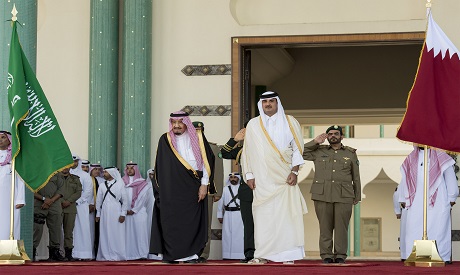In this file handout photo provided by the Saudi Royal Palace on December 5, 2016 shows Saudi King Salman (L) and the Emir of Qatar Sheikh Tamim bin Hamad al-Thani during a ceremony in Doha. (Photo: AFP)
—————————————————————————————–
On Tuesday, Egypt and the United Arab Emirates officially threw their support behind efforts to heal the rift
——————————————————————————————————————————————————————————
Saudi Arabia is pushing for a compromise to end a damaging three-year Gulf dispute, but a full resolution remains out of reach despite its offer of concessions, sources close to the negotiations say.
Saudi Foreign Minister Faisal bin Farhan told AFP last week that the kingdom and its allies Bahrain, Egypt and the UAE — who imposed a blockade on Qatar in June 2017 — were “on board” to resolve the crisis, with an agreement expected soon.
The potential thaw comes as Gulf states position themselves for the inauguration of President-elect Joe Biden, who will welcome the resolution of a row which has undercut US efforts to rein in arch-enemy Iran.
The blockading countries accused Doha of being too close to Tehran and funding radical Islamist movements — charges it staunchly denies.
They originally presented Qatar with a list of 13 demands including shutting down Al Jazeera, a popular regional broadcaster which has rankled Gulf rulers with its high-decibel criticism, and downgrading links with their rivals Turkey and Iran.
Doha flatly turned them down. And after a bitter standoff, the Saudi-led bloc is willing to substantially water down their demands in the final deal, sources familiar with the negotiations say.
A figure close to the Saudi government indicated the kingdom was ready to make concessions by reopening its airspace to Qatari aircraft — saving them from fuel-guzzling detours — if Doha stops funding its political opponents and restrains its media.
“Saudi is pushing (for) it — and Saudi holds the key card which is its airspace for Qatar,” the source told AFP.
The impasse snapped transport links, separated families, and cost billions of dollars in lost trade and investment, damage which the Gulf economies can ill afford as they try to power out of the coronavirus slump.
On Tuesday, Egypt and the United Arab Emirates officially threw their support behind efforts to heal the rift. But the Saudi source said the UAE, a staunch rival of Qatar, had been resistant.
“Emirati anger cannot be allowed to keep this fire burning… (It’s) time to put this issue to bed.”
‘Limited scope’
Another Gulf-based source close to the negotiations told AFP that the Saudi-driven process could result in a peace of sorts but not fully resolve the underlying issues.
The final deal will likely be a joint document setting out the terms, they said, possibly a reformatted version of the 2014 Riyadh agreement between Qatar and Gulf states — a secret pact believed to promote non-interference in each other’s affairs.
According to a Western diplomat in the Gulf, mediators from Kuwait are pushing to get the three main leaders on board — Abu Dhabi’s Crown Prince Mohammed bin Zayed, Saudi Crown Prince Mohammed bin Salman and Qatar’s ruler Emir Sheikh Tamim bin Hamad Al-Thani.
“Those three men will have to agree,” the diplomat told AFP, adding that despite the Emirates’ resistance, Abu Dhabi’s leader was “closely involved” in the process.
“We’re looking at a possible interim solution within a few weeks… I don’t think anyone expects a complete resolution. Everyone will be looking at how warmly the communique is worded.”
Doha-based diplomats cited a senior Qatari official as saying that the final deal had been “agreed in principle” but was “limited in scope”.
The official, they said, suggested Saudi Arabia was unwilling to announce the deal before the end of Trump’s term, possibly to strike a positive tone with Biden who has pledged a tough stance towards Riyadh over its human rights failings.
The US is keen to lift the air embargo which has prompted Qatar to use Iran’s airspace, contributing to the approximately $133 million that Iranian media says Tehran receives annually for overflights, undermining US efforts to squeeze it economically.
‘Existential’ differences
There are already signs that media in both Saudi Arabia and Qatar have begun softening their shrill rhetoric.
Writing this week in the pro-government Okaz daily, which typically lambasts Qatar, Saudi columnist Tariq al-Homayed hailed the “optimistic” mood and called for “unity and cohesion” in the Gulf.
But the real bellwether will be the level of Qatari representation at an upcoming Gulf Cooperation Council summit expected before the end of the year. The attendance of Qatar’s emir would signal a rapprochement is well underway.
The Saudi-led blockade was designed to choke Qatar and force it to align with Gulf interests, but it only propelled a self-sufficiency drive, and pushed the deep-pocketed emirate closer to Iran and Turkey, observers say.
In an embarrassment for Riyadh in July, a UN court ruled in favour of Qatar over the airspace dispute.
Despite Riyadh’s de-escalatory stance, mistrust between both sides runs deep, with Homayed warning the “differences are fundamental and existential, and do not end only with a handshake”.
“It will take a lot of time and sustained effort by all parties to rebuild ties,” said Kristian Ulrichsen, a fellow at Rice University’s Baker Institute in the United States.
“Any agreement will be the start of a longer process of reconciliation rather than an endpoint or a return to a pre-2017 status quo ante.”
Statements, comments or opinions published in this column are of those of the author(s) and do not necessarily reflect the editorial policy of Warsan magazine. Warsan reserves the right to moderate, publish or delete a post without prior consultation with the author(s). To publish your article or your advertisement contact our editorial team at: warsan54@gmail.com

